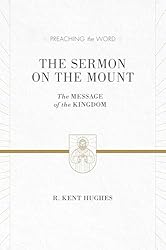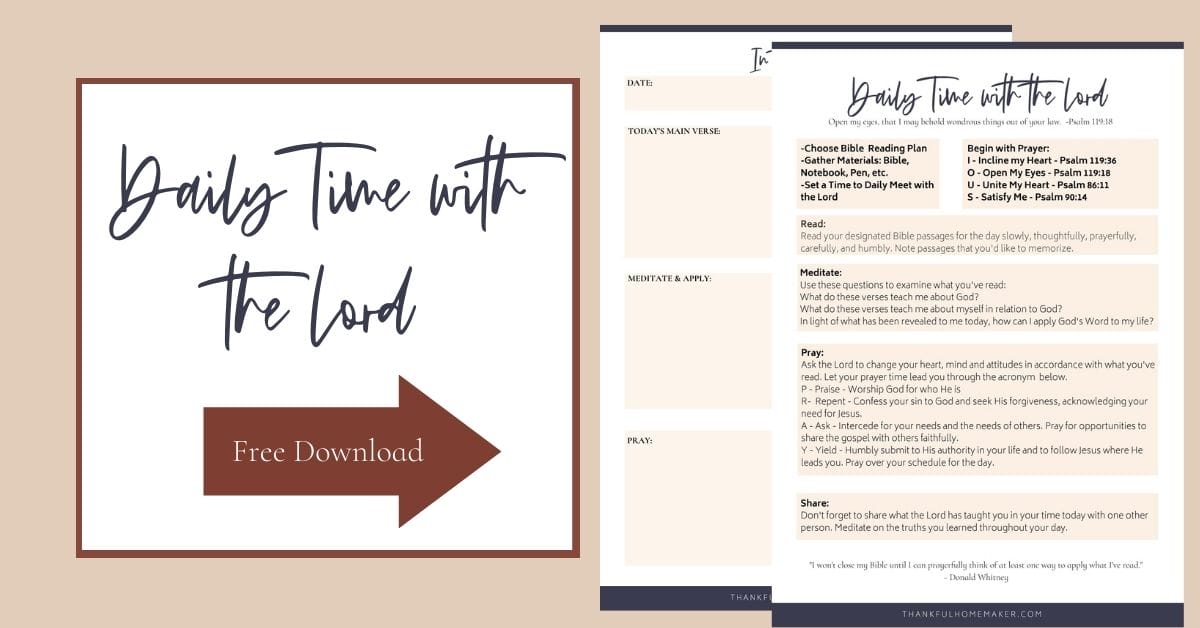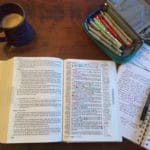My Favorite Bible Study Tools
Fall is just around the corner, and I know for me personally it is a time to rethink my schedule and get back into routines I let slip over the summer months. One routine I hope we never let slip is time in God’s Word. I’m hoping to encourage you today and inspire you with some new ideas or maybe just get you back on track with how you already like to study God’s Word.
I’ve written posts on what my time in the Word looks like, and it changes over the different seasons of my life.
Here are a few to read or listen to or watch:
EP 95 Developing a Daily Bible Reading Habit
Prioritizing Time in God’s Word (Video)
Bible Study Helps for Busy Moms
The Most Important Tool:
Obviously, it is the Bible itself. The Bible is a study tool all on its own. Scripture interprets scripture. One of my best pieces of advice would be just to read it. Read it all the way through on a regular basis. There are tons of bible reading plans online, and you can take longer than a year – it is okay!! You can take three years or more but just read it. We learn about God and what He desires of us, and He speaks to us through His Word.
Bible reading can be such a neglected discipline and many times we find ourselves reading books about the Bible instead of reading the actual Bible itself.
I just pick a different plan every year to go through, and I love a devotional to go along with my reading. I’ve used D.A. Carson’s For the Love of God series, John MacArthur’s Daily Bible, Robert Murray M’Cheyne’s Reading Plan, TableTalk magazine, The Narrated Bible, Professor Horner’s Bible Reading plan (it is a bit more intense but good) and currently I’m reading it through chronologically using The Gospel Transformation Bible as my devotional notes.
Take the time when you’re reading to pick out a passage and work through it using the SOAP method (Scripture, Observation, Application & Prayer) to dig a bit deeper. Look up the cross-references that are listed in your bible to see what other Bible passages related to the one you’re currently reading.
One to One Bible Reading by David Helm utilizing the COMA method of Bible Study (Context, Observation, Meaning and Application) and is a helpful resource to do alone or with a friend or two.
One method that may be a help for busy moms is to use John MacArthur’s recommended way of reading through the Old Testament in a year and reading one book of the New Testament for a whole month or months depending on the size of the book. You would break down that New Testament book if it is longer into several chapters and read and re-read them for the whole month or months. If it’s a short book like Titus, you read it every day for the whole month. In this way, you get very familiar with your Bible, and you may not even need a concordance to find things!
How to Eat Your Bible: A Simple Approach to Learning and Loving God’s Word by Nate Pickowicz is a great resource to start with. It’s a practical approach to reading and studying God’s Word. It’s a super short but jam-packed read and one that’s not only great for you but for your teens too!
Studying the Word:
I have benefitted greatly from The New Inductive Bible Study, and Kay Arthur at Precepts Ministries brought this method to life and made it easy for us common lay people to study God’s Word on our own. There are many tools to use, and my favorite is The New Inductive Study Bible in the ESV. With this Bible and Blue Letter Bible (which I forgot to mention is free!), you don’t need any other tools. Okay, maybe some good marking pens ;).
If I want a more structured study I would turn to the free online studies from Susan Heck. You can also purchase her studies in book form.
Doorposts blog has some good inductive studies on Psalms and various chapters of the bible (see their category list on their sidebar) that are great at getting an introduction to inductive Bible study. I turn to them at times when I need something structured. I’ve bought the physical books, but all their studies are free on their blog too.
I'm hoping to encourage you today and inspire you with some new ideas or maybe just get you back on track with how you already like to study God's Word.Recommended Bible Study Books:
My top picks to learn to study God’s Word for yourself would be, How to Study Your Bible by Kay Arthur, Knowable Word: Helping Ordinary People Learn to Study the Bible by Peter Krol, and How to Study the Bible by John MacArthur. Any of those would be a great place to start.
My Word Study Tools:
I like the ease of online and am thankful for all the apps and websites out there to look up the meaning of a word in Greek or Hebrew.
My favorite is Blue Letter Bible (I use their app on my iPad or iPhone – they have one for Android too!) The Interlinear/Concordance feature is my most used and I do appreciate being able to just click on the cross-references and have all verses right there listed to read with whatever verse I’m studying.
StudyLight is another easy one for word studies, and they also have some great commentaries available online too. I tend to use them when I’m on my computer online and seem to choose Blue Letter Bible when I’m on a device. I think they’re both great resources and the best way to learn them is just to start using them and playing around with them.
Some Other Helpful Resources:
An Expository Dictionary of New Testament Words, by W. E. Vine
The New Manners and Customs of Bible Times, by Ralph Gower.
ESV Exhaustive Concordance by Crossway
Using Commentaries:
I have benefitted greatly by commentaries and finding a theologically sound teacher is important but stating that I’m sharing this from GotQuestions.org on the use of commentaries: (Always check with your Pastor or Elders on commentaries and teachers they recommend)
“Commentaries are widely used in personal Bible study. The advantage of a Bible commentary is that one can quickly gain perspective on the text’s meaning, as understood by the commentary’s author. One caution concerning Bible commentaries is that they should not be used instead of personal study; rather, they are designed for use in addition to personal study. Since the commentary itself is not Scripture, it’s important for a reader to weigh what he reads against other sources, as well as his own Spirit-led analysis. As the products of fallible people, commentaries are not necessarily correct in every word.”
Here’s a list of my top used commentaries and websites:
John MacArthur Study Bible and the Grace to You Bible Study App ( I upgraded to get the study notes online too – love this because we travel a lot so I’m not lugging tons of books with me) – I’ll also use his commentaries on books of the New Testament that I’m studying that my husband has on hand in his library.
PreceptAustin.org is a most excellent free resource – bookmark it and you will find yourself turning to it often as you study God’s Word.
The Treasury of David – Free online Commentary on the Psalms by Charles Spurgeon
Sermons:
I like to listen to sermons online during the week and obviously the most important sermons to hear are the ones from our own home churches. Even if we’re traveling on vacation we try to get to a church and I like to catch up to our home church’s sermons that I miss online. (Pastor Ross is taking us through the book of Matthew now and we’re currently in the Beatitudes and it’s so good – I’ve been reading each week from D. Martin Lloyd Jones book Studies in the Sermon on the Mount to go along with the series at church.)
I may listen to a sermons series on a particular book of the bible that I’m currently studying or just find a series that is good and go through it little by little. SermonAudio, Truth for Life by Alistair Begg, and Grace to You by John MacArthur.
Join us on the Podcast as we work through The Sermon on the Mount or take some time to listen to the Spiritual Disciplines Series on the podcast too.
In Closing & Quick Start Suggestions:
Please remember to offer yourself grace in this area. If you’re good at Bible study, don’t become arrogant about it to someone who is not there yet. We are all still a work in progress.
The most important reminder is to spend time in God’s Word reading it and that may look different for each of us depending on the season in life we are in. If you can set aside at least one day a week (more would be great), you would find such a benefit in your walk with the Lord.
Learning and knowing more about this wonderful God who has redeemed us as his children is such a blessing but even more so is allowing that knowledge to humble us and mold us more and more into the image of His Son by our application of the Word.
The hope is time in the Word will make us more like Christ.
Your turn – what are some of your favorite Bible Study Resources?
Related Resources:
How Crazy Busy Women Make Time for God’s Word



























Great article! You’ve listed some great tools to help in studying the Bible. Thank you for sharing 🙂
Great suggestions. I use many of the same resources and plan to check out a couple of others. Thanks for sharing.
I love Jones’ Sermon on the Mount! Excellent resource! Thanks!
These too are all of my favorite resources!! I love inductive study because it really helps to grasp and remember what you’re reading.